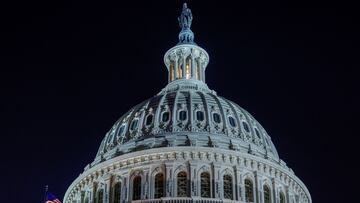Senate approves law to avoid debt default: what does it consist of?
The Senate has passed a law suspend debt ceiling preventing a national default. The law heads to President Joe Biden to be signed. Here’s what in the bill…

Just days before the US government could have defaulted on its debt for the first time in history, the Senate has approved a bill to suspend the ceiling debt, in addition to other measures.
According to the latest estimates by Treasury Secretary Janet Yellen, the US government could have defaulted on its debt for the first time in history as early as June 5. To prevent this, Congress needed to pass legislation to suspend or raise the debt ceiling.
Senate approves law to avoid debt default: what does it consist of?
Following the passage of the bill in the House of Representatives, the Senate rushed to a vote, passing the so-called Fiscal Responsibility Act of 2023 by a vote of 63 to 36. As both houses have already passed the bill and there were no modifications in the Senate, it can now be sent to President Joe Biden to sign it into law and avoid a possible default, which would have serious economic consequences.
Just now, Senators from both parties voted to protect our hard-earned economic progress and prevent a first-ever default.
— President Biden (@POTUS) June 2, 2023
No one gets everything they want in a negotiation, but make no mistake: this bipartisan agreement is a big win for our economy and the American people.
Our…
What is the Fiscal Responsibility Law of 2023?
The law will suspend the nation’s debt limit until January 1, 2025, removing the threat of default until after the 2024 presidential election.
In addition to addressing the debt limit, the bill limits non-defense spending, expands work requirements for some food assistance recipients, and recovers around $30 billion in funds for covid-19 aid, among other political provisions.
This may interest you: Experts warn: AI will lead to the extinction of humanity
The key points of the legislation include aspects related to expenses. Non-defense spending will remain stable in 2024, the following year an increase of 1.0% is expected. On the other hand, defense spending will increase in 2024 by around 3%. In addition, discretionary spending, which is money used to fund federal programs, will regress to fiscal year 2022 levels, while total federal spending would be limited to 1% annual growth for the next six years.
Despite concerns, veterans health care, as well as Social Security, will remain fully funded and unaffected.
As for covid-19 spending, in order to recover money, uncommitted funds from covid-19 relief packages approved by Congress during the pandemic will be rescinded.
Related stories
On the other hand, there will be new work requirements for applicants for the Supplemental Nutrition Assistance Program (SNAP) and Temporary Assistance for Needy Families (TANF).
Here you can review the complete legislation.


